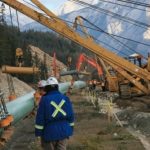Canada’s Supreme Court has dismissed an appeal by British Columbia that aimed to stop work on the controversial Trans Mountain pipeline expansion project, Bloomberg reports, adding that the decision to dismiss the case was unanimous.
“We are all of the view to dismiss the appeal for the unanimous reasons of the Court of Appeal for British Columbia,” the Chief Justice of Canada said after the presentation of arguments.
British Columbia’s government is a staunch opponent of the Trans Mountain pipeline expansion on the grounds that it will increase the risk of spills and leaks both along its route and in the waters around the port of Burnaby where the pipeline is supposed to load oil onto tankers bound for export markets. To prevent the expansion from taking place, the government decided to claim a right to dictate how much oil and gas pass through the territory of the province.
It first took its case to the British Columbia Court of Appeals but the court rejected the case saying that the province did not have jurisdiction over the amount of oil that can pass through its territory.
Later last year the B.C. court told the government it should reconsider its stance on the project, which is the only pipeline project that has received the approval of the federal Canadian government. B.C. then took its case to the Supreme Court.
Trouble is not over for the pipeline expansion project, however. Last month, a group of First Nations filed an appeal against the project at the very same Federal Court of Appeal. The group had argued the federal government had failed to consult them on the project properly. The consultation the government did hold, according to the First Nations, was little more than “window-dressing, box-ticking and nice-sounding words.”
The Trans Mountain expansion project, which Ottawa bought from Kinder Morgan when the company got tired of delays and uncertainty and quit, will increase the capacity of the current pipeline three times to 890,000 bpd and aims to stimulate Canadian oil exports to destinations different from the United States. It will also provide a much-needed outlet for growing oil production in Alberta.





